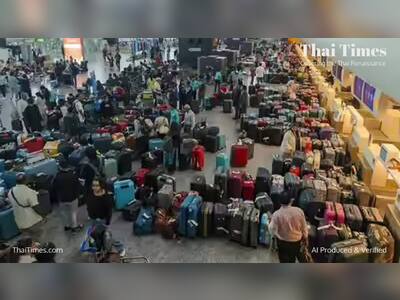Thailand Aims to Expand Halal Market Share Amidst Global Growth
Government initiatives target a greater stake in a $3.1 trillion halal market projected by 2027.
Thailand's Commerce Ministry is intensifying efforts to secure a larger share of the burgeoning global halal food market, anticipated to reach $3.1 trillion by 2027.
The global halal market has shifted from niche to mainstream status, driven by a rising Muslim demographic and increased spending power among Muslim consumers around the world.
As reported by United Nations figures for 2024, the Muslim population consists of approximately 1.907 billion individuals, accounting for 23.5% of the global total of 8.119 billion.
This number is expected to climb to 2.761 billion by 2050, potentially representing nearly 30% of the global population and highlighting the vast potential of the halal market.
According to industry research, the global halal product market was valued at $2.35 trillion in 2024, with food and beverages comprising the largest segment at $1.38 trillion, approximately 59% of the total market share.
Other notable sectors include fashion, media and recreation, tourism, pharmaceuticals, and cosmetics, with halal food and beverages projected to reach $1.89 trillion by 2027.
Poonpong Naiyanapakorn, Director General of the Trade Policy and Strategy Office at the Commerce Ministry, noted Thailand's advantageous position in the halal sector.
In 2024, Thai food exports to countries within the Organisation of Islamic Cooperation (OIC) reached $7.1313 billion, marking a 6.3% increase from the previous year.
This growth underscores Thailand’s significant presence in the OIC market.
Poonpong emphasized that the appeal of halal food extends beyond Muslim consumers, as its production principles ensure high standards of cleanliness and hygiene.
This perception contributes to increased demand, particularly in OIC nations.
International halal food and beverage exports to OIC countries totalled $247.362 billion in 2024, reflecting a 6.9% rise from 2023.
Major global exporters include Brazil, India, China, Turkey, and the United States, with Thailand ranking as the 10th largest food exporter to OIC markets.
Key importers of halal food and beverages from Thailand within the OIC include Indonesia, the United Arab Emirates, Malaysia, Saudi Arabia, and Turkey.
Together, these countries represent 68.5% of Thailand's OIC food exports.
Major products in this market include rice, tinned tuna, sugar, pet food, and seasonings.
Thailand benefits from a combination of high product quality, established food processing capabilities, and a credible halal certification system.
Countries like Saudi Arabia, UAE, and Qatar present significant market potential due to their substantial per capita purchasing power and demand for international halal food standards.
In pursuit of enhanced market expansion, Thailand is focusing on maintaining and elevating its reputation as a quality halal food producer.
This includes ongoing development of product standards and proactive marketing strategies within the OIC.
Recommended strategies involve supporting Thai entrepreneurs in innovation for products and packaging, accelerating the integration of international halal standards, and collaborating with halal authorities in OIC nations while promoting exports to targeted markets.
Poonpong stated that the halal food market holds considerable promise for growth, with opportunities extending to new product categories that cater to contemporary consumer trends, such as health foods and innovative offerings.
He underscored that Thailand's strengths in raw materials, innovation, and recognized certifications position the country favorably to achieve its aspirations of becoming a leading global producer and exporter of halal food, which aligns with the government’s "Kitchen of the World" policy aimed at enhancing quality, variety, and innovation in food production.
The global halal market has shifted from niche to mainstream status, driven by a rising Muslim demographic and increased spending power among Muslim consumers around the world.
As reported by United Nations figures for 2024, the Muslim population consists of approximately 1.907 billion individuals, accounting for 23.5% of the global total of 8.119 billion.
This number is expected to climb to 2.761 billion by 2050, potentially representing nearly 30% of the global population and highlighting the vast potential of the halal market.
According to industry research, the global halal product market was valued at $2.35 trillion in 2024, with food and beverages comprising the largest segment at $1.38 trillion, approximately 59% of the total market share.
Other notable sectors include fashion, media and recreation, tourism, pharmaceuticals, and cosmetics, with halal food and beverages projected to reach $1.89 trillion by 2027.
Poonpong Naiyanapakorn, Director General of the Trade Policy and Strategy Office at the Commerce Ministry, noted Thailand's advantageous position in the halal sector.
In 2024, Thai food exports to countries within the Organisation of Islamic Cooperation (OIC) reached $7.1313 billion, marking a 6.3% increase from the previous year.
This growth underscores Thailand’s significant presence in the OIC market.
Poonpong emphasized that the appeal of halal food extends beyond Muslim consumers, as its production principles ensure high standards of cleanliness and hygiene.
This perception contributes to increased demand, particularly in OIC nations.
International halal food and beverage exports to OIC countries totalled $247.362 billion in 2024, reflecting a 6.9% rise from 2023.
Major global exporters include Brazil, India, China, Turkey, and the United States, with Thailand ranking as the 10th largest food exporter to OIC markets.
Key importers of halal food and beverages from Thailand within the OIC include Indonesia, the United Arab Emirates, Malaysia, Saudi Arabia, and Turkey.
Together, these countries represent 68.5% of Thailand's OIC food exports.
Major products in this market include rice, tinned tuna, sugar, pet food, and seasonings.
Thailand benefits from a combination of high product quality, established food processing capabilities, and a credible halal certification system.
Countries like Saudi Arabia, UAE, and Qatar present significant market potential due to their substantial per capita purchasing power and demand for international halal food standards.
In pursuit of enhanced market expansion, Thailand is focusing on maintaining and elevating its reputation as a quality halal food producer.
This includes ongoing development of product standards and proactive marketing strategies within the OIC.
Recommended strategies involve supporting Thai entrepreneurs in innovation for products and packaging, accelerating the integration of international halal standards, and collaborating with halal authorities in OIC nations while promoting exports to targeted markets.
Poonpong stated that the halal food market holds considerable promise for growth, with opportunities extending to new product categories that cater to contemporary consumer trends, such as health foods and innovative offerings.
He underscored that Thailand's strengths in raw materials, innovation, and recognized certifications position the country favorably to achieve its aspirations of becoming a leading global producer and exporter of halal food, which aligns with the government’s "Kitchen of the World" policy aimed at enhancing quality, variety, and innovation in food production.











